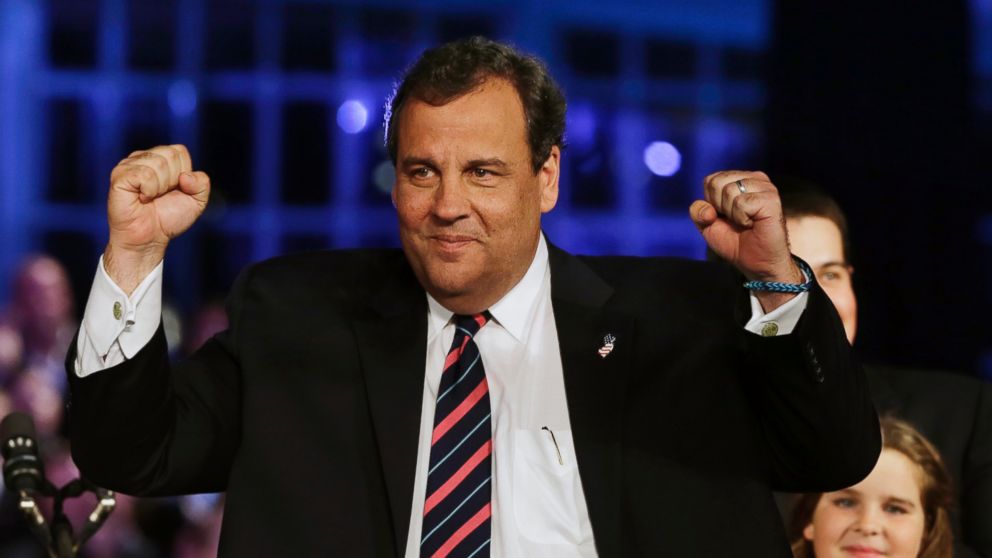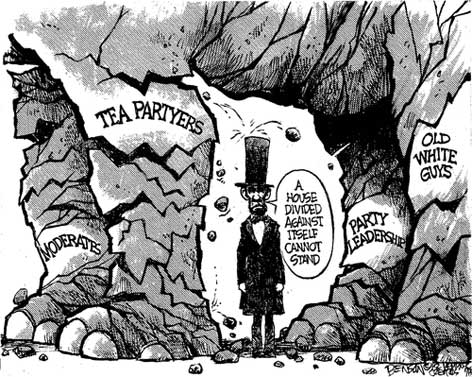By: Garrett Herrin

(Source: ABC News)
It appears we have a winner in the latest battle of the Republican Party’s war with itself following Tuesday’s elections. The Washington Post writes that this war for power is not about ideology or policy, but rather “purity vs. pragmatism, tactics, and strategy.” And if one must put a face to the prgramatic wing, surely the first to come to mind is New Jersey Governor Christopher J. Christie.
On Tuesday, voters in Virginia rejected Republican gubernatorial candidate Ken Cuccinelli, who took hardline positions on abortion, gay rights, and climate change, and instead elected inside-the-Beltway Democrat Terry McAuliffe in an off-year with an incumbent president of the same party, the first time that has happened in battleground Virginia in over three decades. Meanwhile, voters in a deep blue state re-elected a self-described hard-line conservative governor. What gives?
In an interview with CNN’s Jake Tapper that aired on election night, Governor Christie refuted a criticism that he doesn’t represent the state electorate:
TAPPER: I’ve heard a criticism from a Democrat about you…[and] the media and the public which is that if Christie wins…it’s a triumph of personality over policy, meaning people around this state tend to disagree with you on a lot of issues, but they’re gonna re-elect you because they like your style. Is that a fair criticism?
CHRISTIE: It’s why [the Democrats] are losing because it’s the way they think people make decisions. … They think that people go down a checklist of issues and [draw] a pro-and-con line. ‘If there are more checks for this person than for that person, then that’s the person I’m voting for.’ That’s not the way people vote in my experience. I think that the vote is much more visceral. People say, ‘can I trust this person? Do they lead? Do they tell me the truth?’
Ironically, Christie’s answer acknowledges the very criticism Tapper alleges, but Christie suggests that it is not necessarily a bad thing if there is a personality over policy element to the vote because leadership is deeper than policy preferences. And Christie may have a point. He won by 22.3 percentage points in a deep blue state that in the previous presidential election voted for Barack Obama by a 17.1 percentage point margin, all the while arguably governing for the past four years as a conservative. Christie argues that the only reason national Republicans view him as a moderate is because of his cooperation with Barack Obama in the aftermath of Hurricane Sandy: “I think it all goes back to October 31, 2012, that’s all.”
Republicans elsewhere should learn from Christie’s spirit of bipartisanship if they hope to make inroads with demographic groups critical to winning in a changing electorate: Christie took 57 percent of the female vote compared to his opponent’s 42 percent. He also took a majority of the Latino vote and over 20 percent of the African American vote. Nationally, John McCain took 31 percent of the Latino vote in 2008, and Mitt Romney took 27 percent of the Latino vote in 2012. Other high-profile Republicans could only dream of winning by these margins. Christie’s broad appeal in New Jersey might just be a sample of his prospects in the 2016 presidential race. In exit polls, voters in New Jersey nearly placed Christie within the margin of error of the leading prospective Democratic candidate Hillary Rodham Clinton if the two were to face each other in the Garden State. Christie polls closer to Clinton than all other prospective Republican candidates in a recent Quinnipiac University poll of the national electorate, and his re-election is likely to continue to increase his national favorability ratings.
The most critical problem for a national Christie candidacy is getting through a Republican primary stuffed with candidates more conservative than Christie himself. Republicans nominated moderates in 2008 and 2012 only to lose the general election, and some Republicans may be hesitant to nominate another moderate when they feel that the reason they lost was because they didn’t nominate a conservative-enough candidate. The real reasons for their losses wasn’t because of their ideologies (and if it was, perhaps they became too conservative within the course of the campaign); instead, both were weak candidates who made poor choices in their campaigns. John McCain attempted to follow an incredibly unpopular incumbent president of the same party, had to deal with the collapse of the national economy, and selected a running mate who did more to hurt him than to help him; and Mitt Romney lacked personality, seemed awkward, and saw the unofficial end of his campaign with his 47 percent remark. But polling shows that if Republicans want to win the White House, they’ll nominate someone who is less hard-lined conservative on social issues and attracts broad appeal. Christie is that type of candidate. He may not be the only one, but his re-election provides a framework of sorts of how Republicans should approach elections in 2016.


